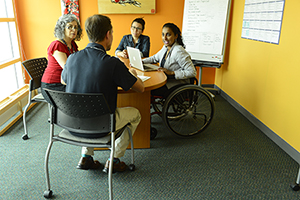 Teaching and helping children "develop into little people" had been Elizabeth Kumar's lifelong passion, but when central nervous system lupus left her paralyzed from the waist down in her mid-20s, necessary medications affected her ability to work full-time in a classroom. For several years she tutored part-time before embarking on a new career as a peer mentor at the ENDependence Center of Northern Virginia (ECNV). In this role, she still uses her teaching talents, but in a slightly different manner—working with adults and helping them with life skills.
Teaching and helping children "develop into little people" had been Elizabeth Kumar's lifelong passion, but when central nervous system lupus left her paralyzed from the waist down in her mid-20s, necessary medications affected her ability to work full-time in a classroom. For several years she tutored part-time before embarking on a new career as a peer mentor at the ENDependence Center of Northern Virginia (ECNV). In this role, she still uses her teaching talents, but in a slightly different manner—working with adults and helping them with life skills.
When Kumar became paralyzed, she was discharged from the hospital without learning many of the skills she needed to live independently. She credits her husband (then fiancée), who also uses a wheelchair, with being her role model and mentor; he encouraged her to gain those skills and reengage in work and the community.
Things Kumar regrettably had to learn the hard way, such as how to apply for disability benefits, or how to transfer into a wheelchair, is what she now teaches others. "Working as a peer mentor has been the best job I've had, because I am able to share what I know," she says. "Many of my consumers are dealing with the things I dealt with years ago."
Shortly after Kumar was hired by ECNV, she had surgery for a pressure ulcer. Both before and after the surgery, ECNV let her work from home as an accommodation. While recuperating, Kumar called in to meetings, which allowed her to remain part of the team, and, more importantly, helped her keep a positive mindset while hospitalized.
In fact, much of Kumar's job at ECNV can be done remotely, and she finds that she often gets more accomplished from home. "A lot of my job," explains Kumar, "is doing research on the computer and helping people apply for different jobs or benefits, helping with resumes or interview skills, and peer counseling, which I can do over the phone."
Another facet of Kumar's job is coaching consumers to become their own advocates and helping them find affordable assistive equipment. She also started "Connect4 Social Hour," a social networking group for young professionals with disabilities that meets at various venues in the northern Virginia area.
Many of Kumar's colleagues at ECNV are people with disabilities. She notes that some consumers, particularly those with recently acquired disabilities, feel that disability benefits are equivalent to a handout. She tells consumers that benefits are credits built up from years of working and nothing to be ashamed about. "When they see me working and getting benefits," notes Kumar, "they think, 'Well, maybe I could eventually go back to work.'"
Work has always given Kumar a sense of purpose and structure. "You want to feel that you're actually a part of the rest of the world," she explains. "For a while I thought maybe it was okay that I not work, but I get so bored and disconnected from everything. To feel independent is the main thing — that feeling is amazing."
